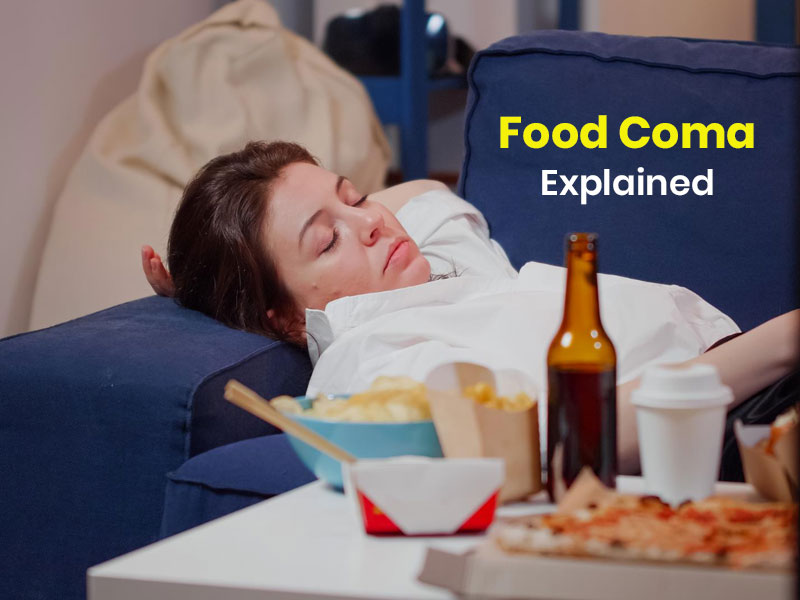
You might have come across the term ‘coma’. This Greek word refers to ‘deep sleep’. But, do you know there is a term called ‘food coma’? No, it’s not what you might think. Food cannot send you to a state of coma. Or, can it? Food coma refers to the lack of energy and sleepiness you experience after you have had a heavy meal, generally lunch. The phenomenon is so common that Merriam Webster dictionary included it in 2020. According to it, a food coma happens because blood and energy are diverted towards digestion in place of other functions. The medical term for food coma is ‘postprandial somnolence’. It is made of three Latin words: ‘post’ meaning ‘after; ‘prandial’ meaning ‘late breakfast’; and ‘somnolence’ meaning ‘sleep’.
Table of Content:-
Symptoms Of Food Coma
Now that you are familiar with a food coma, you know how common it is. Many of us experience such an energy crash following a heavy lunch, especially the one with lots of carbohydrates. Here are the symptoms you would experience in a state of food coma:
- Lack of energy
- Sleepiness
- Tiredness
- Lack of concentration
Also read: Can Excessive Fatty Food Make You Sleepy? Here's Why
Food Coma: Cause(s)

(Photo Credit: Unsplash)
Although a common occurrence, food coma, in general, hasn’t been well-studied.
- Some experts say it happens because blood and energy are diverted towards digestion, resulting in a lack of supply to the brain. This, however, has been refuted in several studies.
- Some pieces of research suggest that large meals result in a food coma. A study involving fruit flies showed that one feels sleepy after having heavy meals high in protein and sugar. Another study involving participants eating pizza showed those who ate more had a greater dip in energy levels.
- Some also attribute this to evolutionary patterns that are also seen in many animals. Hence, people might feel drowsy after eating to save energy that they might need for later use.
Is Food Coma Dangerous?
No, a food coma isn’t dangerous, unless you have to drive or handle heavy machinery. Although there isn’t much research into it, a food coma lasts for just three or four hours.
Also read: Sleepy After Lunch? Tips To Manage Afternoon Fatigue
How To Prevent Food Coma

(Photo Credit: Unsplash)
A food coma isn’t dangerous. Rather if you doze off for a few hours after having lunch, it might leave you energised and fresh. However, dozing off in the middle of the day on a working day isn’t something you can afford. Hence, managing a food coma becomes crucial. Here are some tips that can help:
- Moderate Meal: Heavy meals have been shown to cause food coma. However, minimising your portion size might help you with minimising the intensity of food coma.
- Stay Hydrated: Dehydration can cause a drop in energy levels. Hence, drink the requisite two to three litres of water daily.
- Exposure To Bright Light: Bright natural light has an impact on sleep. Hence, exposure to sunlight or bright light after a heavy meal can help you with a food coma.
- Take A Nap: Sometimes, shedding rigidity and giving up on your senses can help. If you feel sleepy, take a nap. But not for two to three hours straight, just 15-20 minutes of power nap can help.
Other than these, if you sleep enough during the night, it will make you less sleepy during the day. Hence, sleep for the requisite 7-8 hours every night. If nothing helps, there is caffeine at your rescue.
Photo Credit: Freepik
Also watch this video
How we keep this article up to date:
We work with experts and keep a close eye on the latest in health and wellness. Whenever there is a new research or helpful information, we update our articles with accurate and useful advice.
Current Version
